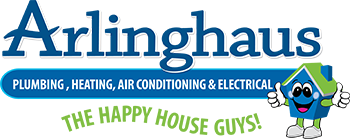When winter descends, and temperatures plummet, the risk of your pipes freezing and potentially bursting increases significantly. This can lead to a host of problems, including water damage and costly repairs. However, with proper knowledge of how to make sure your pipes don’t freeze and planning ahead, you can prevent this common winter issue.
In this blog, we’ll explore five essential tips to make sure your pipes don’t freeze, ensuring your home remains safe and functional during the cold months. Additionally, we’ll include crucial information on what to do if your pipes do freeze so that you can promptly and safely get the situation under control.
1. Keep Your Home Warm
One of the most effective tips to make sure your pipes don’t freeze is to keep your home at a consistent temperature, day and night. Even if you’re away, it’s crucial to maintain a warm environment inside your house. Setting your thermostat to the same temperature during the day and night can prevent the internal pipes from freezing. Remember, the cost of heating your home slightly more is far less than the cost of repairing a burst pipe.
Seal Leaks to Prevent a Chilly Home
Cold air entering your home can contribute to pipes freezing. Check areas near windows, doors, and even garage doors for drafts. Use weather stripping, insulation, or caulk to seal these leaks. Keeping garage doors closed, especially if there are water supply lines in the garage, also helps prevent cold air from freezing these pipes.
2. Insulate Pipes
Pipes in unheated areas like basements, crawl spaces, and near exterior walls are more prone to freezing. Insulating these pipes can be a highly effective method in your arsenal of how to make sure your pipes don’t freeze. Use foam pipe insulation or heat tape, making sure to follow the manufacturer’s instructions to avoid any risk with flammable materials.
Insulate Your Home
Improving overall insulation in your home, especially in areas with little or no insulation, can prevent cold air from affecting your pipes. Consider adding insulation to attics, basements, and crawl spaces, which not only prevents frozen pipes but can also improve your home’s energy efficiency.
3. Let Faucets Drip
When discussing tips to make sure your pipes don’t freeze, we have to mention the benefits of allowing your faucets to trickle when outdoor temperatures drop. Allowing a slight drip from faucets connected to exposed pipes or pipes running through unheated spaces can prevent pipes from freezing. When water is moving, even slightly, it becomes much more difficult for it to freeze. This tip is particularly useful during extreme cold snaps.
Select the Right Faucets
Focus on faucets that are fed by pipes running through unheated or poorly insulated areas. It’s not necessary to let every faucet in your home drip, just those most at risk.
4. Open Cabinet Doors
By opening kitchen and bathroom cabinets, you allow warmer air to circulate around the plumbing, particularly where pipes are located in exterior walls. This can be an easy and effective way to make sure your pipes don’t freeze, as it lets the heat from your home reach these otherwise isolated pipes.
Be Mindful of Household Safety
Although it’s helpful to know how to make sure your pipes don’t freeze by opening cabinet doors, you still need to think about safety. While opening cabinet doors, ensure that household chemicals and cleaning supplies are out of reach of children and pets for their safety.
5. Be Prepared for Emergencies
In the event of a pipe freeze or burst, knowing the location of your main shutoff valve is crucial. Turning off the water supply immediately can minimize damage from a burst pipe.
Have the Right Tools and Knowledge
If you think one of your pipes is frozen, it’s important to have a few pieces of equipment on hand. Having tools like an electric hair dryer or electric heating pad for thawing pipes (never use an open flame) and the knowledge of how to apply heat safely can be invaluable. However, if you’re unsure how to thaw frozen pipes with these tools or feel uncomfortable with these methods, it’s always safer to contact a licensed plumber.
Emergency Contact Information
Keep contact information handy for emergency plumbers — like Arlinghaus. Our team of plumbing and drain experts is available to assist you with any plumbing emergencies you may experience, including frozen or burst pipes.
Contact Arlinghaus Today for Professional Plumbing Services!
Don’t let a frozen pipe disrupt your winter. By following these tips to make sure your pipes don’t freeze and knowing how to act quickly in an emergency, you can protect your home from significant damage. For professional assistance and expert advice, reach out to Arlinghaus, the reliable emergency plumbers in Cincinnati, OH, and beyond. Our experienced team is ready to provide prompt and professional services to address any plumbing issue, ensuring your home’s safety and comfort.
Remember, a little preparation can go a long way in preventing major plumbing disasters. Now that you know how to prevent frozen pipes, it’s time to take action. Stay warm, stay safe, and trust Arlinghaus to keep your home’s plumbing in top shape this winter!


